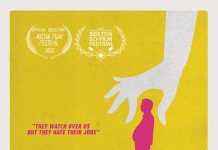Times are hard enough in the NHS at present – and even more so for somebody who has to speak on behalf of the doctors who run things. In Andrea M. Catinella‘s new short drama THE INTERPRETER, the onus is on Turkish interpreter Belma (Yasmine Alice, who also writes and produces) who has to deal with two significant emotional cases – schizophrenic patient Kamelya (Eda Catalcam) who feels her doctor is a rival and determined to have her say Belma’s way. Then Belma has to deal with Ahmed and terminally-ill wife Melahat (Oscar Reed, Nilgun Direncay).
Belma finds herself with a sensitive conundrum in both ways, but can she create the right impression and message for those in dire need….?
THE INTERPRETER creates a focus on the struggles that modern Britain has to face up to with segregated cultures who have no desire to integrate on occasions. Combining a very desperate air with occasion black comedy, the short hits the right tone with its’ highly charged emotional heart.
About the film:
Yasmine Alice:
“
I’m a lawyer turned actress, and when I made the transition into acting in year 2015, I experienced a huge pay cut.I was looking for part-time work to support my acting career and I came across interpreting. I went through series of online training and booked the job. Majority of times I would be sent to Denmark Hill to the psychiatric wards, as well as police stations, courts, council meetings and residential visits.
I have told many people they haven’t got much more time to live, that the government is taking their kids into care, that they are not allowed to see their kids anymore by law, that they just got sentenced to prison, sat through numerous therapy sessions and listened to people’s life stories and delusions.
The characters in this film are fictitious, but I have experienced stories as traumatic as these many times. The reactions of the families, their desperation along with the inability to communicate on their own free will, having to rely on me to do the job and the frustration that comes along with that was a lot to take in.
Not only did I have to establish trust that I was capable of doing the job, something most doubted with my “young looks” , I was also never given any support, training or aftercare by my employers. I wasn’t emotionally trained to deal with any of this.”
Andrea M. Catinella:
“With THE INTERPRETER, I want to touch a subject that has a huge stigma. So many people are afraid to talk about mental health issues.
The film is dedicated to my mother who was suffering from schizophrenia. Yasmine, the writer/producer, had some incredible stories that she experienced in the past while she was working as an interpreter in some mental health Hospitals and had to translate for some people affected by these conditions.
So we thought why not make a film about it all? When she came back with the script, asking me to direct “The Interpreter” I was ecstatic, as it’s a bilingual film and I cherished and accepted the challenge. My mother had just passed away and thought this could have been the right tribute to her and all the people affected by her condition, during my years in Italy I spent much time in mental health hospitals while visiting my mom, so I had a clear idea about the situation inside these institutions and how patients and doctors are usually affected by the condition and sometimes the lack of support by institutions.
I also have a few friends who are nurses in mental health institutions in the UK and usually tell me about their daily routine and how challenging it can be. “The Interpreter” puts all these issues under the spotlight.
The Interpreter tells the story of Belma, a freelance interpreter whose love life is collapsing but she still has to face a tough shift at work where she will understand the meaning of real love. The story presents another health condition which is Alzheimer’s, something I experienced with my auntie who died from this, after spending her last 5 days with her in palliative care in Rome.
The reason why when I was thinking about the vision for the film I decided to divide the film into two parts color-wise and in terms of shots, the first part had to be more greenish and the second part more bluish. Regarding the shots, I wanted to create a contrast between the two scenes with the two patients, where with the first patient the Dutch angle and the medium two shots are used to highlight the difference between Kamelya’s world and Belma and Doctor Aashvi’s world, that’s why when Kamelya is telling her truth we go on a dutch angle, as her reality can appear distorted to Belma and Dr. Aashvi.
For the second part, I wanted to give a more claustrophobic sense to the audience, to show that Alzheimer’s is something that slowly reduces and deteriorates the patient’s life and all his or her closest,
This is the reason why the close-up is often used when Belma gives the news to Ahmet, same close up when he received the news about her condition and same for Dr. Kofi as he is also experiencing Ahmet’s pain, even if in another form. Going between close-up and wide shows the audience how dealing with someone you love who has Alzheimer’s can be a roller coaster of emotions.
In the end, the message I want to raise with “The Interpreter” film is love in all forms, and Belma’s journey from the breakup to empathizing more with Kamelya’s loneliness and idea of love to facing the eternal love showed by Ahmet who is still taking care of Melahat, and her love for him that despite her sickness she still loves his face. Some shots in the film explain Belma’s journey from the pull-in before entering the palliative care room to the pull-out when after translating for him she has to leave Ahmet to his destiny.
In “The Interpreter” , each character has their past and the way these conditions have affected or changed them, every emotion or reaction is shown on screen by the talented cast. The slow pace of the film is needed for the audience to stop and experience every detail and mood of every character. The Interpreter shows the viewer how experiencing our fragility and other people’s fragility can help us understand others more and make us evolve as better human beings.
For me, “The Interpreter” is also a dedication to all the Turkish people, a country that I always found fascinating and full of culture, and as a Sicilian director, my background and the culture of my hometown are very similar to our shared past. The experience on set has been thrilling, challenging, and emotional, where all the crew and I have felt the emotions lived by the characters of the film.
The huge work from everyone has allowed us to film this unique and emotional drama in only 1 day, and I’m pretty sure we reached the goal of giving something meaningful to the audience.”
THE INTERPRETER won Best Short Film at the London Independent Film Festival 2024. For more on the Festival, including tickets and info for the 2025 Edition as and when announced, please go to:
Please follow and like us:






































